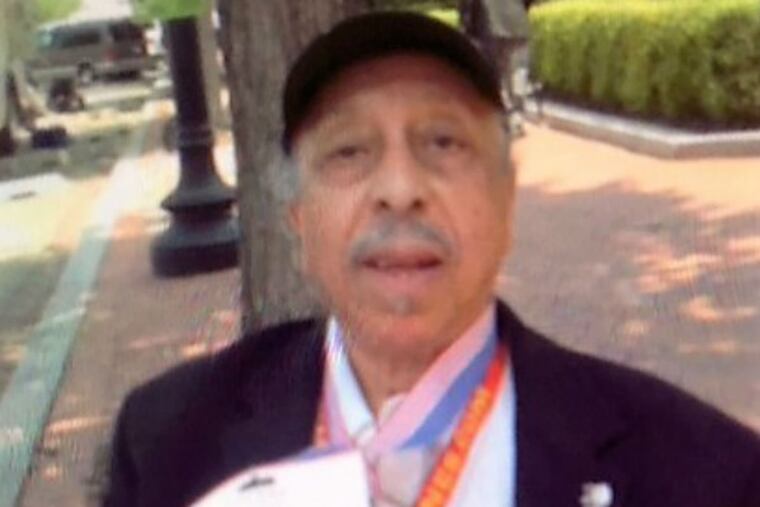William Theodore Carney Jr., 92, Montford Point Marine and leading Philly jazz producer
"He was a Philadelphia icon and lived an incredible life in the spotlight," said Joseph H. Geeter 3d, president of the Marine association's Philadelphia chapter.

William Theodore Carney Jr., 92, of West Oak Lane, one of the first Montford Point Marines and later a band leader, drummer, and music producer, died Wednesday, Dec. 13, of heart failure at Einstein Medical Center.
Mr. Carney responded in 1943 when the call went out for African Americans to integrate the armed forces during World War II. He joined what came to be known as the Montford Point Marines – named for their training facility at Montford Point, N.C. – and served until 1946.
In 1965, the men assembled in Philadelphia to commemorate their service by forming the Montford Point Marine Association. Mr. Carney became a faithful member, attending meetings through last September.
"He was a Philadelphia icon and lived an incredible life in the spotlight," said Joseph H. Geeter III, president of the association's Philadelphia chapter. "We were blessed to have him at our last few meetings this fall, and his mind was sharp until the end."
The recruits were awarded the Congressional Gold Medal in 2012 for "outstanding perseverance and courage that inspired social change in the Marine Corps," according to the award citation. In June 2012, Mr. Carney traveled with his unit to Washington for the award ceremony.
Known as "Mr. C," Mr. Carney was 18 in 1943 when he took a bus southward to join his unit at Montford Point, he said in an oral history. He and his fellow Marines quickly found they weren't welcome.
They were housed in segregated quarters near Camp Lejeune, where their white compatriots were billeted in relative comfort. The black Marines could only visit the base in the company of white military staff.
"When I arrived, I had to sleep in unfinished huts," Mr. Carney said. "It was really something. Prejudice was running so strong in the United States. It was unbelievable. We had to [drill] all day and were placed on work gangs in the early evening to build the camp at night.
"It was an all-wooded area for black Marines only. We were putting in fill, in areas that bred yellow jaundice and malaria. We were there to prove something. We were there to prove that we should be respected as citizens of America," Mr. Carney said.
Mr. Carney was deployed to the South Pacific in 1943 aboard the aircraft carrier Hornet and saw combat during the four-month battle with the Japanese for possession of Guadalcanal.
"The experience overall was about pushing and fighting all the way to get fair treatment," Mr. Carney said, but it did have positive aspects: "I came home on liberty, and it was a great thrill because the black people stared at me in my uniform, and it made me feel like somebody."
Born in Philadelphia to William Theodore Carney Sr. and Lillian Owens, Mr. Carney grew up poor. His father was a song and dance man who also cleaned windows.
"I remember being walked down to Broad and Arch and standing on the sidewalk, and I looked up at my dad washing windows on City Hall," Mr. Carney said. "I always liked seeing him up there, because I knew that he would gather all the baby pigeons that would be in the pigeon nests up in the windows. Then we would have pigeon stew for dinner."
Mr. Carney's mother died when he was 4. Mr. Carney's father knew that his son had musical talent, so he trained the boy on the violin starting at age 5. Mr. Carney played the violin until he was 11, when his father died. The young man enrolled in Northeast High School and later mastered the drums.
When he returned home from the Marines, Mr. Carney formed bands with some of the prominent musicians of his day. One called the Hi-Tones consisted of drummer Albert Heath, saxophonist John Coltrane, jazz pianist and organist Shirley Scott, and Mr. Carney as vocalist.
When Scott left the group, Mr. Carney found another keyboardist in Gertrude "Trudy" Pitts, whom he married in 1958. They toured the nation and the world, giving concerts. The couple settled into Mr. Carney's house and had two children.
The two produced many musical events, including their "Jazz in the Sanctuary" concerts, which hosted musicians such as sax player Grover Washington Jr. and singer Etta James.
One of Mr. Carney's best-known accomplishments was producing a fund-raiser for the Philadelphia Clef Club of Jazz and Performing Arts in the 1990s so that it could move to Broad Street. He wanted to make jazz the forefront of the Philadelphia music scene.
"I would say he will be remembered as an ambassador of jazz," said his son, William Theodore Carney III, known as "TC III."
As his health failed, Mr. Carney stayed involved with the Montford Point Marines. "He was a tough guy," Geeter said. "He had a number of surgeries, but he was resilient and always bounced back. Every time he came to meetings, it was an inspiration."
Mr. Carney's wife died in 2010. In addition to his son, he is survived by a daughter, Anysha T.; three grandchildren; and a brother.
A viewing starting at noon Friday, Dec. 22, will be followed by a 2 p.m. funeral service, both at the Philadelphia Clef Club of Jazz, 738 S. Broad St. Musicians will play. Interment is private.
Donations may be made to the Carney Family at www.gofundme.com/TrudyPittsMusic.